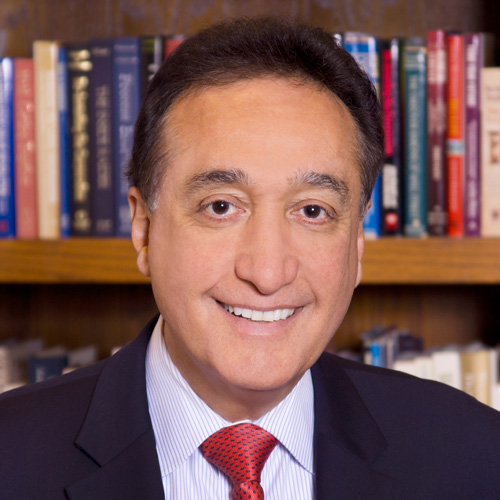
“It was called data processing then,” says Ramón Baez of information technology. “I’ve been in the industry since 1977, but everything changed for me when around 1982, a young programmer showed me how we could automate everything we were doing manually. I realized that we could utilize technology to make people more effective and efficient and after that, I was hooked.”
A lot has happened since then, both in IT and in Baez’s career. His first role in the field had him managing a handful of programmers, but he went on to serve as chief information officer (CIO) of a diverse and powerful array of companies, including Northrop Grumman. His twenty-five years at Northrop Grumman opened up the world to Baez.
When he was transitioning out of his time there, he received about ten calls in a single month from other companies courting him. He went on to serve as a global CIO at Honeywell Automation Control Solutions Group, Fisher Scientific, Kimberly-Clark, and Hewlett-Packard. None of that would have been possible, he says, if it weren’t for leaders at these companies who saw something in him that he didn’t necessarily see in himself: a leader.
Baez is affable, personable, and humble, characteristics that go over well for any leader, but it’s the way he’s able to make horribly complicated tech talk accessible that is his true gift.
“I attribute so much of what I’ve experienced to people who gave me opportunities, who were willing to take a chance on this fast-talking Puerto Rican guy,” he says with a laugh. “But the other part of that is, I think I’m a good communicator. I speak plainly about what technology can do for organizations and for business leaders in a way that makes sense.”
Board Snapshot
Kaiser Permanente, Board of Directors
DocuSign, Advisory Board
The Hispanic IT Executive Council (HITEC), Board of Directors
Over the course of his career, Baez became the go-to CIO for undertaking massive transformations, but in 2016 he decided to close that chapter of his life. That doesn’t mean he rode off into the sunset, though. Unlike many retirees, Baez didn’t slow down after leaving Hewlett-Packard.
In April 2016, he decided to delve into a world he admittedly wasn’t very familiar with: healthcare. He took on an opportunity to serve on the board of directors for Kaiser Permanente, a private company that has grown to become the largest managed care organization in the United States with an annual revenue more than $60 billion.
He had thought about the boardroom years before joining Kaiser, though. It was during his time at Honeywell that Baez first considered board directorship.
“I thought, if I keep doing what I’m doing at these large corporations—making large transformations, developing national and global perspectives, and dealing with diversity—I could be valuable to a board,” Baez says. “I had that thought in my forties, and honestly, I’m still kind of bummed I waited another ten years before I actually joined a board.”
The grandfather of five has been as strategic about serving on boards as he was about shaping his career. You can’t just be on any board, he says. You should only choose boards in industries you’re interested in, at companies you’re excited about, and perhaps most importantly, you have to believe that your knowledge and experience will have a positive impact.
It was Kaiser Permanente who reached out to Baez. With an admirable reputation and exacting standards, he knew it wasn’t a given that he would join the board—and the company did not disappoint. The interview consisted of meeting with the entire existing board. Baez says the experience was “intense,” but when he found out he was chosen he was “absolutely giddy.”
“It’s just so wonderful to be around extremely smart people thinking about a national and global impact in providing quality, affordable healthcare,” he says. “I’m proud to be a part of this.”
Baez contributes to Kaiser’s community benefits; governance, accounting and nominating; and audit and compliance committees. Though he has never worked in the healthcare field before, he is familiar with most of the issues that have arisen—and that, he says, is the benefit of having an IT professional on your board.
Though he only has a few meetings under his belt, the experiences thus far have
confirmed his opinion that boards only benefit from technology expertise, but not just someone who knows how to use it. The key, he says, is to have someone who’s deployed major enterprise applications and systems and dealt with cybersecurity. In other words, not a techy, but a technologist.
At a recent meeting, the former CIO says he was sitting there, nodding his head in agreement, thinking back to issues that he dealt with while with various companies. As an IT professional who worked at five other major enterprises, he lived every problem discussed.
“This kind of experience and sort of, inherent understanding, is valuable to any board,” Baez says. “Do you know the only person at a company, other than the head of HR, who gets a view of
the whole company? It’s the CIO. They bring all of the problem solving and critical thinking skills that a board needs, and I only hope we see more tech leaders taking on these roles.”
 In the Director’s Seat With Esther Aguilera
In the Director’s Seat With Esther Aguilera
Esther Aguilera: Technology continues to change the way we live, work and play. As you mention in the article, technology can make people [and companies] more effective and efficient. As companies have become more reliant on technology, they face new threats or risks, such as cybersecurity or system malfunctions. What is your advice to board colleagues as a path to promote enterprise-wide digital transformation while ensuring safeguards and risk are part of the equation?
Ramón Baez: Most companies are realizing that to remain competitive, they must digitize their processes and customer experience. This is why it is important to have IT leaders that are staying connected with Silicon Valley and keeping current with emerging technologies firms. This must also include keeping current on what tools will assist them in protecting their digital assets from the bad guys. From a board perspective, it is imperative to know what framework their company is using to protect these digital assets, for example, NIST (National Institute of Standards and Technology). It’s also key to have a person on the board that knows how to communicate with the technology leaders (CIO and CISO) to discuss the key metrics that should be reviewed with the board from a risk-management perspective.
EA: You provide a smart perspective for others considering corporate board service to “choose boards in industries you’re interested in, at companies you are excited about,” and “[where] your knowledge and experience will have a positive impact.” Tell me more about why you found the experience of landing on the board of a large enterprise intense and any advice for candidates going through the interview process.
RB: The way I review my career today is similar to managing a portfolio. It’s tough for me to go through an interview process if I am not passionate about the company or industry. Having passion for something is intense. It is also important for me to know whom I will be serving with on the board, if the culture of the board be a fit for me, and if they aligned to my personal values. I have worked for large enterprises across multiple industries and serving on the a board of such a company ups the intensity. Back to the portfolio, I am also interested in working with a few start-ups and smaller companies just to mix things and keep things interesting.

